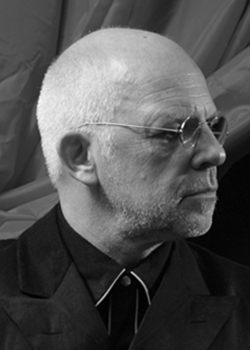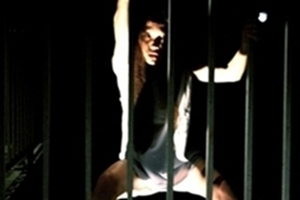“We’ve got nobody to blame but ourselves,” declares Trevor Knight. The forcefulness of the sentiment is belied by the soft-spoken voice. It’s a combination of determination and mellowness, and it becomes apparent that this characterises the man and his work to a T.
The issue under discussion is Irish theatre’s traditional four-week rehearsal period, a process that, in Knight’s view, doesn’t allow nearly enough time to let an idea find its best form. As a composer and a theatre practitioner, he’s quietly adamant that the musical aspect of things gets a terribly short shrift on our stages. “There’s an awful lot of music for theatre that I just regard as furniture removal music. It’s like, here’s a scene, and we need a bit of time to get the set on and off, so we’ll have a little interlude. It shouldn’t be: ‘let’s throw a bit of feckin’ music up there’. In a way, I became, by default, a director: that’s why I’m directing my own stuff, so I can get my own way now.”
Or so he may like us to believe. In deeper conversation with Knight, however, you get less of the picture of a tyrant and more one of the collaborator, and if there’s some extreme focus involved, it’s all in ultimate service to the idea. Especially to an idea that’s been knocking around Knight’s brain for almost twenty years.
Slat premiered in the Galway Arts Festival in 2007, and is based on an account found in psychoanalyst Bruno Bettleheim’s book,
Recollections and Reflections. “There was a chapter on feral children, and every page was just amazing,” says Knight. At first he thought he might write a musical piece inspired by it.
The funny thing about ideas is that they bide their time, and the story of Anna, a young girl born beneath the floorboards of a house in France during the second World War, had, perhaps, ideas of its own. One can’t imagine the story being told in any other fashion than it is now, with Knight leading a dream team that includes visual artist Alice Maher, singer Julie Feeney, and most crucially, Butoh artist Maki Watanabe (above).

Japanese movement tradition of Butoh found Knight (left), rather than the other way around, when he collaborated with The Temenos Project on
Equivalents. Based on the life of artist Georgia O’Keefe, that production was like a lightning strike in Knight’s practice, causing him to question the way in which he had been making his theatrical work. Ultimately it introduced him to Watanabe, and choreographer Gyohei Zaitsu, both of whom would work with him on
Slat.
Slat returns to the Ulster Bank Dublin Theatre Festival under the ‘ReViewed’ umbrella, a strand of programming from which Knight has already benefited, via Barabbas and their show,
Circus, in the festival last year. That appearance led to an invitation to New Haven, USA, for the Arts and Ideas Festival. Whether Knight wishes for more of the same seems uncertain, particularly when he talks about the integrity and spontaneity of Watanabe’s performance.
“We agreed that we can’t do any more than three performances without a break, for Maki. And that’s as many as she’ll ever do,” he says. “Normally speaking, she only does three, or two, even. When Maki is going to become this [feral] creature, she’s already going there a week beforehand. So three hours before the performance, she’s already pretty close to being in the state. All that energy – if you’re just trying to recreate it, it gets too predictable.”
So what’s it all about then? Not fame and fortune? Could it just be about the actual joy of making work, of the sheer act of creativity? Yes, and also the fact that the way in which the Butoh practitioners work is very much in line with Knight’s musical background.
“When I started out playing music, one of the first things I did was play modern jazz, in the early 1970s, with Chick Corea, John McLoughlin, Miles Davis, and we had no problem in doing a forty-minute improvisation,” he says. “I was in lots of bands, and backed many people along the way, but had forgotten about this freedom, this looseness, the really wild abandon. So when I came in contact with the Butoh performers, I got a great sense of freedom, and of expression. There’s nothing to bar you doing anything. There are no rules at all.”
There are, however, rules in actual theatres, and Knight’s original ambition — that the audience stand on a floor and view the production through the gaps between the boards — was scuppered by a variety of health and safety regulations. Trapdoors weren’t allowed either. The resulting construction, of a scrim through which light shines, and a series of scaffolds (below) under which the musicians play and Watanabe climbs, is an excellent solution and very much in line with the voyeuristic impetus.
The notion of improvisation is one that Knight cites again and again, a notion that runs counter to the way in which most theatre is made, on this island. “The sacredness of the word — it drives me up the wall. A lot of the time the writing part of a show is finished well before I would get near it, and also the director has got his ideas, about the style of music, and all.

“Since starting to work with Butoh people, even if we have a set of words, we try to lose them and see what else we can do in an improvising way. You’ve always got the narrative, and the words on the pages to go back to, so you’ve got your straight line from the start to the finish. But very often the cul-de-sacs and the avenues into the deep forest will prove much more exhilarating and stimulating.”
It takes guts to wander into the forest, particularly in the current climate. Knight is as much on tenterhooks as anyone else with regard to Arts Council funding in 2010, and his latest project with Alice Maher and Olwen Fouéré,
Collision, is one of the projects in the queue. He shrugs, and grins, and reckons that there are ways and ways to get the necessary cash: “We’ll have to figure some other way to do it, like in the old days, and not rely on mammy and daddy… which is not a bad thing…”
Nor is it any bad thing to bring a successful piece of work back to the attention of audiences and decision makers, and Knight is putting his future money where his mouth is — again, with gentle fervor. “There’s a lot of postmodern stuff that tries too hard to be difficult, and intellectual, and there’s no heart. There’s no emotional connection, it just exists, and that’s that. A lot of new music has got the same effect: I go to many concerts, as well as pieces of theatre, and I go in, and the only thing that I come out with is anger: what a waste of money. I’m just very old-fashioned. I want this stuff to be transformative! I want to come out and have thought about my own life, and about my relationship with the human race.”
Slat opens at The Empty Space, Smock Alley, on September 28th. See
www.dublintheatrefestival.com
Susan Conley is a novelist and arts journalist.